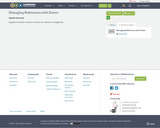
A guide to the basic functions of Zotero for reference management.
- Subject:
- Information Science
- Material Type:
- Module
- Author:
- Tara Stieglitz
- Date Added:
- 08/23/2018


A guide to the basic functions of Zotero for reference management.
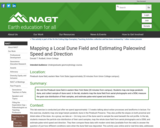
We visit the Pinebush dune field in eastern New York State (20 minutes from campus). Students map one large parabolic dune, and collect sample of dune sand. In the lab, students map the dune field from aerial photographs and a DEM, measure the grain size distribution of their samples, and estimate paleo-wind speed and direction.
(Note: this resource was added to OER Commons as part of a batch upload of over 2,200 records. If you notice an issue with the quality of the metadata, please let us know by using the 'report' button and we will flag it for consideration.)
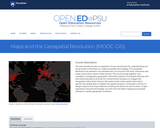
The past decade has seen an explosion of new mechanisms for understanding and using location information in widely-accessible technologies. This Geospatial Revolution has resulted in the development of consumer GPS tools, interactive web maps, and location-aware mobile devices. This course brings together core concepts in cartography, geographic information systems, and spatial thinking with real-world examples to provide the fundamentals necessary to engage with Geographic Information Science. We explore what makes spatial information special, how spatial data is created, how spatial analysis is conducted, and how to design maps so that they're effective at telling the stories we wish to share. To gain experience using this knowledge, we work with the latest mapping and analysis software to explore geographic problems.
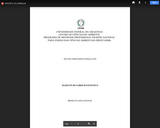
Nos ecossistemas de várzeas do Alto Solimões, o trabalho realizado pelas famílias agricultoras tem propiciado muitos benefícios à população local, dentre os quais a “conservação da agrobiodiversidade”, a “segurança alimentar” e a construção do saber matemático por processos empíricos. Com base nessas constatações, esse estudo teve por objetivo desenvolver um material educativo a partir da Etnomatemática construída recursivamente no cotidiano de trabalho dos agroecossistemas familiares. Para o delineamento da pesquisa foi adotada a abordagem teórica da dialética da complexidade sistêmica, tendo o Estudo de Caso como desenho da pesquisa de campo com a aplicação das técnicas observação direta, entrevistas, registros fotográficos, diários de campo e construção de mapas mentais. O estudo revelou que a realização dos diferentes tipos de trabalho familiar da localidade depende do ritmo das águas, ocasionado pelo fenômeno denominado pulso de inundação. Nesse contexto, percebeu-se que ao interagirem com a dinâmica espacial e temporal dos ecossistemas de várzeas, as famílias adquirem o domínio ambiental, elemento fundamental para re/construção do saber matemático local. Outro fator evidenciado foi a preocupação demonstrada pelos agricultores familiares no que diz respeito ao destino da comunidade. Esses acreditam que se as crianças e jovens perderem o interesse em herdar a cultura de trabalho dos pais, é possível que em pouco tempo, por volta de 20 anos, não se tenha a força de trabalho suficiente e adequada para se realizar a conservação da agrobiodiversidade. A partir dessas constatações, construiu-se e aplicou-se o produto educacional denominado “Maquete do Saber Matemático” no ensino da escola da Comunidade São José, localizada no município de Benjamin Constant, estado do Amazonas, com o intento de contribuir para que os educandos possam refletir e valorizar suas culturas de trabalho, compartilhar novas imaterialidades matemáticas, possibilitando-se assim serem capazes de conquistar futuras melhorias às famílias, demais comunidades e ao sistema ambiental.
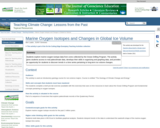
Students explore paleoclimate of the Quaternary Period by working with marine oxygen-isotope data from Ocean Drilling Program (ODP) core 677.
(Note: this resource was added to OER Commons as part of a batch upload of over 2,200 records. If you notice an issue with the quality of the metadata, please let us know by using the 'report' button and we will flag it for consideration.)
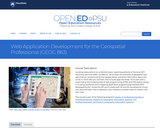
Locating restaurants in an unfamiliar place, reporting potholes to the local DOT, obtaining real-time traffic conditions... All of these are examples of geospatial web apps that are revolutionizing how people obtain and share information about the world. In GEOG 863, you will learn how to build apps like these. You'll start with a quick look at the fundamentals of web programming (HTML and CSS) before diving in to using JavaScript and a mapping application programming interface (API) developed by Esri. Using this API, you'll create both 2D and 3D visualizations of your own data and learn how to develop a user interface to enable users to interact with your map.

This course provides students with decision theory, estimation, confidence intervals, and hypothesis testing. It introduces large sample theory, asymptotic efficiency of estimates, exponential families, and sequential analysis.

We will explore the mathematical strategies behind popular games, toys, and puzzles. Topics covered will combine basic fundamentals of game theory, probability, group theory, and elementary programming concepts. Each week will consist of a lecture and discussion followed by game play to implement the concepts learned in class.
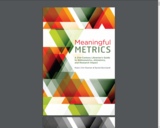
What does it mean to have meaningful metrics in today’s complex higher education landscape? With a foreword by Heather Piwowar and Jason Priem, this highly engaging and activity-laden book serves to introduce readers to the fast-paced world of research metrics from the unique perspective of academic librarians and LIS practitioners. Starting with the essential histories of bibliometrics and altmetrics, and continuing with in-depth descriptions of the core tools and emerging issues at stake in the future of both fields, Meaningful Metrics is a convenient all-in-one resource that is designed to be used by a range of readers, from those with little to no background on the subject to those looking to become movers and shakers in the current scholarly metrics movement. Authors Borchardt and Roemer, offer tips, tricks, and real-world examples illustrate how librarians can support the successful adoption of research metrics, whether in their institutions or across academia as a whole.
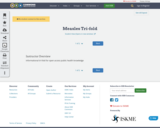
informational tri-fold for open access public health knowledge

These two self-paced resources were created using Sway (a combination slide deck / infographic / comic format) for older middle school/younger high school students. They explain the concepts of claims and evidence in a media literacy context.

These three self-paced resources were created using Sway (a combination slide deck / infographic / comic format) for older middle school/younger high school students. They explain the concepts of perspectives and bias in a media literacy context and with a specific approach: 1) that everyone has perspectives, but not all perspectives are biased and 2) that in some circumstances it's OK to get information from sources created by people with a strong perspective on the topic.

This self-paced resource was created using Sway (a combination slide deck / infographic / comic format) for older middle school/younger high school students. It explains the distinctions between statements, opinions, and claims in a media literacy context and with a specific approach: 1) "statements" are not the same as "facts" because they're not necessarily true and 2) there are meaningful differences between opinions and claims.

This series of three lessons was designed for older middle school/younger high school students. The goal is to build a foundation of shared understanding and vocabulary before embarking on media literacy activities. The lessons introduce the concepts of "ways of knowing," "trusted experts," and "settled facts," which are useful things to agree on before discussing the reliability of an information source or the truthfulness of a media message.

OSPI Media Literacy/Digital Citizenship grantees, please use the REMIX option to adapt this template for your needs. Cover mage by ElasticComputeFarm from Pixabay
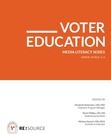
This series of videos is part of the RAC’s educational programming. These videos include audiovisual primary sources, and are designed to be part of a media literacy curriculum.The clips of audiovisual documents serve as primary sources that can be viewed, analyzed, and discussed in a classroom setting to help students build media literacy skills.
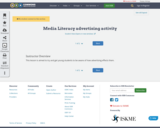
This lesson is aimed to try and get young students to be aware of how advertising effects them.

Lesson on Media Literacy
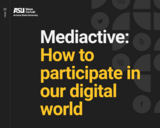
We’re in an age of information overload. Learn how media literacy principles can help you make sense of your digital media environment.
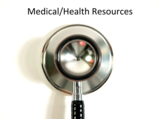
This presentation and worksheet is used in a Library session with second year Library & Information Technology Students taking INFM 202. Objectives: Construct a search strategy from a clinical scenario using the PICO model.Know where to find (& how to use) the controlled vocabulary in a key health database.Accompanying materials: Worksheet for developing PICO question for given scenarios.Four scenarios with suggested answers to PICO question task.